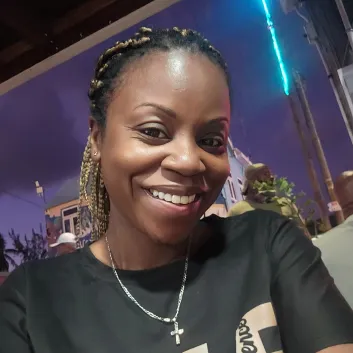- From the Community
- March 5, 2025
Strength Through Generations
Sarah’s journey with MS began long before her own diagnosis—her mom was diagnosed when Sarah was just 10 years old. Growing up, Sarah helped care for her mom as the disease progressed, preparing her for some of the challenges she would later face herself.

"My mom’s symptoms started when I was young," Sarah shares. "She had back pain and trouble walking, but it took years to get a diagnosis. Over time, she went from using a cane to a walker, then to a wheelchair. It’s very emotional for me to think about because she lost almost every function and eventually moved into a long-term care facility when she could no longer live independently. My dad and I visited my mom every single day. I’d help her change the TV channel, brush her hair, and feed her meals," Sarah says. "It was hard watching her lose so much independence, but it also gave me perspective and a deeper appreciation for the little things we often take for granted."
Sarah’s experience with MS took on a new dimension when she was diagnosed with the disease herself. What started as double vision quickly led to visits with doctors, a neurologist, and an MRI. Within weeks, she received the diagnosis she had feared. "It was a huge shock," Sarah says. “I was scared, unsure about what this meant for me and how it was going to impact my life moving forward. I struggled to tell my family because of everything they’d watched my mom go through. It was especially hard to tell my mom because she was living in long-term care at that point and was having a very difficult time with her MS. I didn’t want to burden her with it. That was one of the most difficult conversations I’ve ever had.”
Though her MS journey has been different from her mom’s, Sarah admits she sometimes worries about her future. "Seeing my mom’s MS progress so aggressively makes me think about what could happen to me, but I try to remind myself that MS is different for everyone.”
Sarah’s passionate about MS research, reflecting on the impact it’s had on her MS journey: “Research is so important. When my mom was diagnosed, she had no treatment options. The doctor told her, ‘You have MS, we're sorry. We can monitor this, but we're going to send you home.’ There was nothing she could do. When I was diagnosed with MS, it was a completely different story. I was immediately given options for treatments and was able to see right away that my journey with MS was going to be very different than hers. Advancements in MS research have directly impacted my journey.”

Sarah’s treatment requires infusions every six months, allowing her to maintain her job and stay active in her community. She’s passionate about her work and giving back to the community—balancing a full-time job with volunteering and advocating. "Not every day is easy," she admits. "Some days, fatigue hits hard, or symptoms flare up, but I’m grateful for how far treatments have come."
Sarah also reflects on the profound impact her mom’s MS journey has had on her own life, "She may not be here with us anymore, but her spirit and positivity continue to guide me. My mom’s positive outlook, even through her challenges, motivates me to stay hopeful and focus on the impact I can have.” Sarah participates in MS Walk every year to raise awareness and funds for MS research. "It’s inspiring to see so many people come together for a common cause," she says.
Sarah also volunteers, advocates for the MS community, and was a community representative in 2018—reviewing applications submitted for research funding and sharing her perspective with other members of the review committee, including Canadians researchers. “I’ve always wanted to be involved in the MS community and give my time back because I know the impact research can have. I know we're incredibly close to understanding what causes MS and hopefully finding a cure very soon,” she says. "We’re all fighting for a future without MS."
- Log in to post comments

